Friday, December 21, 2012
Trading obstacles hurt Umeme shares at NSE

A customer care staff explains about different voltage metres at the
Lugogo Umeme Centre in Kampala. Umeme shares began trading at the
Nairobi Securities Exchange on December 14, 2012. File Photo.
By Nicholas Kalungi
Posted Wednesday, December 19 2012 at 00:00
Posted Wednesday, December 19 2012 at 00:00
In Summary
The market systems of both Uganda Security Exchange
(USE) and NSE are not inter-connected; thus, cannot facilitate trading
for cross-listed companies.
Even though Umeme—the country’s main power
distributor— started trading its shares at the NSE secondary market on
Friday, media reports reported yesterday that Umeme’s shares had failed
to trade for the second consecutive day after entering the market last
week.
This is attributed to the fact that the market
systems of both the Uganda Security Exchange (USE) and NSE are not
inter-connected; thus, cannot facilitate trading for cross-listed
companies in the region.
While explaining this matter, Mr Kenneth Kitariko,
the African Alliance chief executive officer, said the issue revolves
around were the shares are located; how one can access them and later
make a transaction.
“What is happening is there is no mechanism to
facilitate trade. For a transaction to occur under the current
circumstances, one needs to make these electronic shares (viewable on
Nairobi counters) physical through getting a certificate from Uganda and
then taking it to Kenya,” Mr Kitariko said.
He added: “These shares are originally listed on
the USE market. The people in Kenya can electronically view them at the
NSE market but cannot buy them.”
Mr Japheth Katto, the executive director of
Capital Markets Authority (CMA), acknowledged the presence of both
regulatory and infrastructure obstacles.
He, however, said the regional capital markets
authorities are committed to fixing some of their problems in the first
quarter of 2013.
“There is a regulatory problem that we are working
to fix. Companies cross-list but cannot sell shares. Our infrastructure
is not inter-connected. It is a complicated matter but we hope that
within the first quarter of 2013, we will have a solution to it,” Mr
Katto said, adding:“In the long run, we are looking at having one
integrated system that will enable all the five markets in the region to
communicate together. Provided we can harmonise the systems and have
common standards, we would have fixed this problem.”
Challenge of cross-listed counters
Mr Patrick Mutimba, the Makerere University director for investments, said cross-listed counters also face exchange rate challenges which may limit arbitrageurs and hurt trade.
Mr Patrick Mutimba, the Makerere University director for investments, said cross-listed counters also face exchange rate challenges which may limit arbitrageurs and hurt trade.
“Arbitrage is where a trader seeks to take a risk
less return from concurrently trading two securities in the same sector
that indicate a clear case of mispricing. One may do this by selling the
overpriced security while buying the underpriced security,” Mr Mutimba
said.
He further explained: “The challenge will still be
currency considerations since the Ugandan company earns Ugandan
shillings while the Kenyan companies earn Kenyan shillings. This
difference may be mitigated since all will be using the Automatic Tariff
Adjustment by 2013 January.”
Umeme became the first utility company registered
within East Africa but outside Kenya to trade its shares at the Nairobi
Stock Exchange after its introduction of 1,623,878,005 shares of Umeme
Holdings Limited on NSE’s Main Investment Market Segment (MIMS) at a
reference price of about Shs 273 (Ksh8.8).
Prior to this, several companies registered in
Kenya had cross-listed and are trading at the Uganda, Rwanda and
Tanzania bourses but no company from these regional countries had ever
cross-listed and traded at NSE.
In Kampala, Umeme’s share continues to trade at
Shs275, the same amount it sold its share during the Initial Public Offering period.
UCC sets new deadline for counterfeit phones

A collection of mobile phones. Counterfeit phones have flooded the
Ugandan market, prompting communications regulator UCC to set a deadline
for blocking their usage. PHOTO. BY FAISWAL KASIRYE.
By NICHOLAS KALUNGI
Posted Friday, December 21 2012 at 02:00
Posted Friday, December 21 2012 at 02:00
In Summary
UCC’s move follows an increase in the influx of fake mobile handsets onto the Ugandan market.
Kampala
Communications regulator, Uganda Communications
Commission (UCC), has issued a new deadline indicating that it will
block counterfeit phones starting January 31, 2013.
The commission’s latest position comes about two
months after the same body back-tracked on its earlier commitment to
block fake phones from accessing any network in November this year, and
instead shifted it to next year.
In a press statement, UCC said that all new fake
phones will be blocked starting January 2013 while old counterfeits but
already in use will be denied network access in July of the same year.
“New counterfeit mobile phones that have previously not subscribed to
any network shall be denied access to all networks. The proposed date
for the implementation of this phase is January 31, 2013,” part of the
statement reads in part.
Implementing deadline
It adds: “All counterfeit mobile phones, including the ones that have already subscribed to a network, shall be disconnected. The proposed date for the implementation of this step is July 1, 2013.”
It adds: “All counterfeit mobile phones, including the ones that have already subscribed to a network, shall be disconnected. The proposed date for the implementation of this step is July 1, 2013.”
But, Eng Geoffrey Mutabazi, the executive director
of UCC told the Daily Monitor on phone yesterday, that while the
commission is committed to block counterfeit phones as stipulated on the
schedule, the process is a matter of public interest that may need to
be postponed.
Eng Mutabazi said: “That is our timeline and if
the public can respond positively, we can even implement this much
earlier. However, we are aware that this is a matter of public interest
that may involve discussions over the dates.”
The move by UCC to eliminate fake phones follows a
growing entry and use of such handsets on the Ugandan market in recent
months, following Kenya’s September 30 de-activation of sim-cards
carried in fake handsets. This is in addition to the fact that fake
mobile phones are far cheaper compared to original ones.
If implemented, thousands of people both users and
traders, will be affected. Although there are no figures to quantify
the number of fake phones on the market, a move through down town
Kampala shows that many of the shops trading in phones have a bigger
stock of counterfeit phones and parts than original phones.
Single father of five needs Shs107m for new kidney

Achora Masaensio Gwokto, a single father of five, needs Shs107m for a
kidney transplant. Because of failed kidneys, he cannot do anything on
his apart from talking. Photo by Rachel Mabala.
By Christine Katende
Posted Thursday, December 20 2012 at 00:00
Posted Thursday, December 20 2012 at 00:00
The problem started with diabetes that manifested
in form of blisters on his feet in 1993. “I discovered later that I
could be having diabetes after a postmortem report of a colleague of
mine who collapsed and died revealed that he had diabetes,” he says.
Gwokto rushed to Mulago National Referral Hospital
for a test but he was immediately admitted after doctors found out that
his blood sugar level was very high. To save his life, doctors had to
control the sugar level before he could be discharged. He was later
advised to treat himself with an insulin injection that he had to have
once every day, it is on this and some drugs that he has lived until
this year in August when he went into coma.
After 10 years with diabetes, he developed high
blood pressure which forced him to get medical insurance at
International Hospital Kampala so that he could get treatment at any
time. “Life did not improve. Instead, it worsened. Soon I would spend a
day without urinating yet I used to go for short calls more than three
times a day. The swelling developed again on the feet, legs and
stomach,” he narrates.
The diagnosis
The routine check-ups Gwokto went for revealed that his kidneys had started getting ill and thus the body reactions. Doctors gave him drugs (he can’t recall which ones in particular) to treat the kidneys in vain. “I was then referred to Dr Ssekasanvu, a kidney specialist in Kamwokya, who told me that my kidneys had only remained with five per cent functioning levels. With that, he would not even recommend dialysis saying that the only option was to undergo a transplant because dialysis treatment is every expensive and does not solve the problem either,” he says.
The routine check-ups Gwokto went for revealed that his kidneys had started getting ill and thus the body reactions. Doctors gave him drugs (he can’t recall which ones in particular) to treat the kidneys in vain. “I was then referred to Dr Ssekasanvu, a kidney specialist in Kamwokya, who told me that my kidneys had only remained with five per cent functioning levels. With that, he would not even recommend dialysis saying that the only option was to undergo a transplant because dialysis treatment is every expensive and does not solve the problem either,” he says.
After three months, Gwokto says Dr Ssekasanvu
referred him to Mulago for kidney failure tests that revealed both his
kidneys had completely failed. It was after this test that he was
advised to start dialysis treatment, towards the end of August. He
received the treatment thrice a week at a fee of Shs1.2m but once missed
a full week’s treatment, when his family failed to raise the money, as
Charles Onen, his brother, notes. “Because we couldn’t sustain the
treatment fees we asked the doctor to reduce the sessions to twice a
week at Shs800,000, including the prescribed drugs.
Gwokto cannot walk so it is his brother, an air
craft engineer with Uganda police, who lifts him from place to place. He
cannot do anything for himself apart from talking. His diet is limited
to posho, fresh fish and beans with some milk, once in a while, to
balance his diet.
What he needs
Dr Robert Kalyesubula a physician (Nephorologist) at Mulago says, “Gwokto was diagnosed with hypertension, diabetes which developed into kidney failure with reduced urine output, difficulty in breathing, and aneamia. Apparently he has developed end renal disease which means that he needs an urgent kidney transplant if he is to survive,” he says. He needs about Shs107m for the air ticket, hospital fees, a caretaker, and up keep for a donor who he has not got yet.
Dr Robert Kalyesubula a physician (Nephorologist) at Mulago says, “Gwokto was diagnosed with hypertension, diabetes which developed into kidney failure with reduced urine output, difficulty in breathing, and aneamia. Apparently he has developed end renal disease which means that he needs an urgent kidney transplant if he is to survive,” he says. He needs about Shs107m for the air ticket, hospital fees, a caretaker, and up keep for a donor who he has not got yet.
The 49-year-old single father of two, who is also
guardian to a late brother’s three children used to work as a civil
servant with the local government in Moroto and later Kiboga.
To Help:
You can call Charles Onen Gwokto on 077-2408273.
Or deposit money on account no. 0140529139001 in the name of Achora Masaensio Gwokto, Stanbic Bank, City Branch
You can call Charles Onen Gwokto on 077-2408273.
Or deposit money on account no. 0140529139001 in the name of Achora Masaensio Gwokto, Stanbic Bank, City Branch
NRA: Gun bans at schools create dangerous places
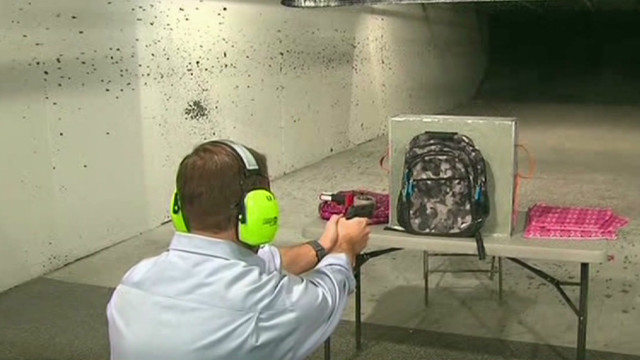
Bullet-proofing kids
STORY HIGHLIGHTS
- NEW: NRA Executive Director Wayne LaPierre says NRA horrified at school shooting
- NEW: But he says that policies banning weapons at schools create risks
- The Obama administration has started debate on gun control
- More funerals of the victims will take place Friday
Wayne LaPierre spoke to
reporters in an appearance that was interrupted twice by protesters
shouting anti-NRA slogans and bearing banners in front of his podium,
including one that said, "NRA killing our kids."
The nation's most
prominent gun rights lobby joins "the nation in horror, outrage and
earnest prayer for the families" who "suffered such an incomprehensible
loss" in Newtown, Connecticut, LaPierre said.
However, he said, schools
remain a target by criminal gunmen because they are not protected by
armed security the way other important institutions are.
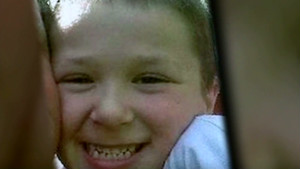 Father: My son was my best friend
Father: My son was my best friend
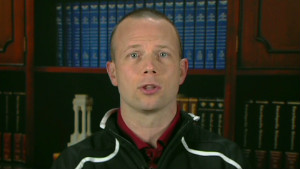 Coach's Sandy Hook speech goes viral
Coach's Sandy Hook speech goes viral
 Pastor: For some, too soon to forgive
Pastor: For some, too soon to forgive
Policies banning guns at
schools create a place that "insane killers" consider "the safest place
to inflict maximum mayhem with minimum risk," LaPierre said.
Such policies leave schoolchildren "utterly defenseless, and the monsters and the predators of the world know it," he said.
Friday's event was billed as a news conference, but LaPierre only read a statement; he took no questions.
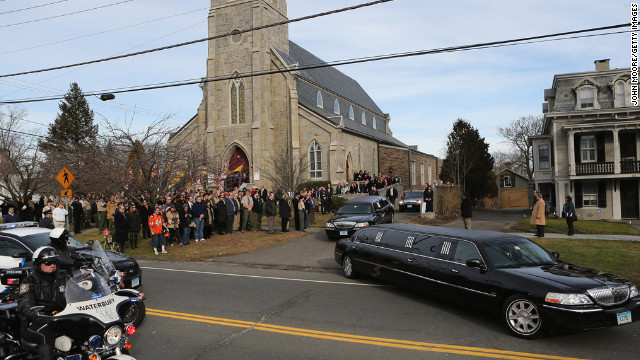 Funerals: A community says goodbye
Funerals: A community says goodbye
One week ago, a gunman
forced his way into Sandy Hook Elementary School and shot 20 students,
six adults then himself dead in Newtown.
Adam Lanza had killed his mother before arriving at the school.
Across the nation Friday morning, church bells rang in remembrance of the victims. The NRA was among those groups that observed a moment of silence at 9:30 a.m., the same time as last week's massacre.
NRA power and money go a long way in states
Despite the relative
silence early on from the powerful lobbying group's offices in Fairfax,
Virginia, the NRA is regrouping in anticipation of a massive legislative
push for gun control legislation, a gun policy expert said.
Kristin Goss, an
associate professor of public policy and political science at Duke
University and author of "Disarmed: The Missing Movement for Gun Control
in America," said that strategy is part of the organization's playbook
after an incident such as this one.
After such a terrifying event, when there is a national outcry, the NRA typically lays low, Goss said.
"They're used to seeing this cycle, express condolences and hope the attention will shift to a new issue."
Obama starts gun control debate
This week, the Obama administration put into motion an effort to change U.S. gun laws.
Vice President Joe Biden
met with Cabinet members and law enforcement leaders at the White House
to start formulating what Obama called "real reforms right now."
 Sweet comfort delivered to Newtown
Sweet comfort delivered to Newtown
 Mom: Speak truthfully about Sandy Hook
Mom: Speak truthfully about Sandy Hook
 Scams seek to exploit Newtown tragedy
Scams seek to exploit Newtown tragedy
 Family's Christmas without Newtown hero
Family's Christmas without Newtown hero
More than 195,000 people have signed an online White House petition supporting new gun control legislation.
A slight majority of
Americans favor major restrictions on guns: 52%, up five points from a
survey taken in August after the July shooting inside a movie theater in
Aurora, Colorado, where 12 people died, according to a CNN/ORC
International poll released Wednesday.
Parents defend right to keep guns in the home
Biden will lead a White
House effort to craft proposals aimed at preventing another tragedy such
as the Newtown shootings. The recommendations are due sometime in
January.
That same month, several
lawmakers have promised to introduce or reintroduce gun control
legislation, ranging from a reinstatement of a federal ban on assault
weapons to banning the sale of high-capacity magazines.
Since the shootings, a
number of conservative Democrats and some Republicans who have supported
gun rights have said they are open to discussing the issue.
Sen. Dianne Feinstein,
D-California, said she will introduce legislation to reinstate the
assault weapons ban that expired in 2004. The White House has said that
the president supports that effort.
House Democratic Leader
Nancy Pelosi took her own step towards reform Wednesday by announcing a
new task force on preventing gun violence.
Pelosi said the task
force will work towards restoring the assault weapons ban, strengthening
the background check system, and addressing mental health and violence
issues.
The NRA, with its
roughly 4.3 million members, is the standard-bearer for protecting the
Second Amendment. It is also the source of hefty campaign donations.
During the 2012 election
cycle, the NRA donated $719,596 to candidates. Republicans received
$634,146 of that, according to the Center for Responsive Politics'
analysis of federal campaign data.
Some $85,450 went to Democrats, many of them in states that are considered more conservative when it comes to gun control laws.
Gun owners fear new legislation could tread on their rights
Tributes ongoing for victims
Carloads of teenagers
from a Minnesota school that suffered a mass shooting in 2005 headed
toward Newtown on Thursday to offer their support.
Also Thursday, burials were held for three children and two teachers.
More than 2,200 miles west of Newtown, Ogden, Utah, the hometown of shooting victim Emilie Parker, was festooned with pink ribbons as her parents brought her body back for burial.
"This sucks -- there's
no reason for us to be here tonight," her father, Robbie Parker, told
friends and well-wishers at a memorial service Thursday night. "And I'm
so thankful for everybody that's here."
His voice trailed off as
he struggled for composure. Seeing the pink -- his slain daughter's
favorite color -- made him and his wife, Alissa, "feel like we were
getting a big hug from everybody."
Also buried Thursday, at an undisclosed location, was Nancy Lanza,
the shooter's mother, whom he killed before the school rampage, said
Donald Briggs, a friend of the family who grew up with her in Kingston,
New Hampshire.
Plans had not been finalized for the burial of the gunman, her son, Adam.
Three 6-year-olds were
among those buried Thursday: Allison Wyatt, who loved to draw and wanted
to be an artist; Benjamin Wheeler, who loved the Beatles; and
red-haired Catherine Hubbard, who loved animals.
Gun owners fear new legislation could tread on their rights
By Halimah Abdullah and Allison Brennan, CNN
December 21, 2012 -- Updated 1303 GMT (2103 HKT)
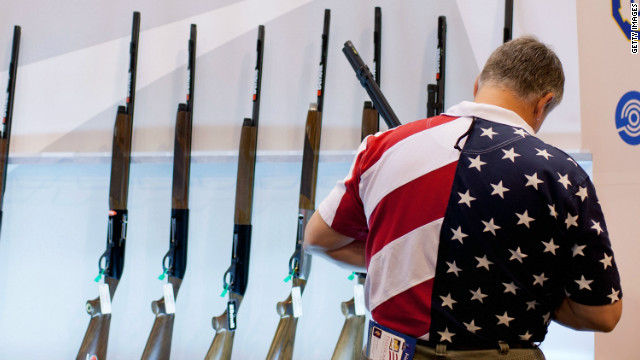
NRA promises 'meaningful contribution'
STORY HIGHLIGHTS
- Gun owners have walked a careful line in the wake of the Connecticut school shootings
- Gun sales are up across the country in anticipation of possible gun-control legislation
- Some gun owners part with the NRA on policies, calling its recent announcement "garbage"
- Taking away Second Amendment rights, some gun owners say, can lead to tyranny
"My dad bought me a
single-shot .22 rifle at an Ace Hardware store in Chicago for $19.95,"
Klein remembered. "I used to take that gun on the bus when I was 11
years old and go down to the shooting range. You couldn't do that now;
you would have the FBI on you."
Those bus trips to the
firing range started a lifelong passion for the Vietnam veteran and
lifetime National Rifle Association member and recruiter who owns Lou's
Sporting Goods in Bowie, Maryland.
His shop sells everything
from handguns to AR-15 semi-automatic rifles -- the military-style
weapon used in several mass shootings, including the one last week in
Newtown, Connecticut, that claimed 28 lives, including 20 children,
their principal, the shooter's mother and gunman Adam Lanza, who took
his own life.
Klein's business is booming. And like many gun owners, he said he doesn't think limiting firearms will prevent another massacre.
"Gun control is not the
answer; it's about education and about responsibility," said Klein, who
supports background checks, a waiting period, gun safety courses and
mental health screening.
 Dershowitz: 'NRA is buying their facts'
Dershowitz: 'NRA is buying their facts'
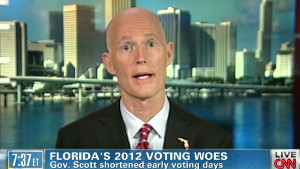 Florida's Scott talks Conn. shooting, NRA
Florida's Scott talks Conn. shooting, NRA
 Fear of new laws drive gun sales
Fear of new laws drive gun sales
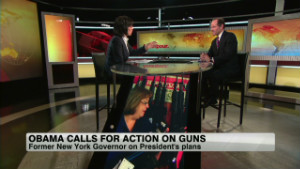 Could the NRA become obsolete?
Could the NRA become obsolete?
Klein and millions of
other small-town gun shop owners, hunters, housewives, former police
officers and just plain everyday folks who proudly defend their right to
bear arms have walked a tenuous line in the week following the Newtown shootings.
They've tried to balance
responding to the nation's grief and horror at a crime that ended so
many young lives, while worrying about what gun rights advocates see as a
threat of knee-jerk legislation that could tread on their
constitutional rights.Florida
"I believe the Second
Amendment provided that the average American citizen should have the
same rights to armaments as the military. But do I want my next-door nut
job neighbor to have a bazooka? No," said Noel Flasterstein, a Florida
attorney and gun rights advocate.
Mike Zammitti, a young gun owner in New England, agrees.
Zammitti, 22, lives in
Boylston, Massachusetts, and has three guns -- a .22 rifle, a
.25-caliber pocket pistol and a .22 Luger handgun. He also is a Class-A
license holder, which allows him to "conceal and carry" his guns with
him. But that doesn't mean that he does it.
Poll: Are Singaporeans least happy?
By Alexandra Hoegberg
December 21, 2012 -- Updated 1608 GMT (0008 HKT)

Singapore is 'least emotional' country
STORY HIGHLIGHTS
- A Gallup survey shows that Singaporeans are least likely to report positive emotions
- Singapore has one of the highest per capita GDPs globally
- U.S. economists have found that income only affects happiness up to a certain amount
- Panama is the world's happiest place
Singaporeans were least
likely to report having positive emotions-- despite the fact that they
enjoy one of the highest per capita GDP values in the world.
The international
pollster measured "positive emotions." Carried out last year in 148
countries, the survey asked around 1,000 persons in each country five
questions about what positive experiences people had had the day before:
if they had been well-rested, treated with respect, if they smiled or
laughed a lot, and whether they'd done or learnt something interesting.
In Singapore, only 46% of
the interviewed answered "yes" to these questions, compared with 55%
reported from people in Haiti and Afghanistan. Even in Syria, where the
uprisings that later developed into a civil war took place in 2011, 60%
of the people asked answered yes to the survey's questions.
Economists in the United
States have found that domestically, income only affects daily happiness
when earning up to $75,000 annually. A higher income than that doesn't
make much of a difference for American citizens' well-being, Gallup
wrote.
The population that
reported the most positive emotions was Panama, a country with a per
capita GDP ranking 90th in the world. In fact, eight out of the 10
happiest countries in the survey are located in Latin America.
As for Singapore, this is not the first time it has come in last in a Gallup poll.
Last month, Singapore ranked as the least emotional country, which measured the daily emotions of people in 150 countries during a three-year period.
MPs withdraw from Nebanda death probePublish Date: Dec 21, 2012

Dr Bitekyerezo (L) congratulates pathologist Onzivua after his release from police custody at Dr. Baryomunsi looks on
newvision
The team of medical parliamentarians led by Kinkizi West MP Chris Baryomunsi has officially withdrawn from the investigations into the sudden death of Butaleja woman legislator Cerinah Nebanda.
A report presented by Workers MP Sam Lyomoki to the Parliament
said that they had withdrawn from the investigations because there had
been continuous attempts by the Police to frustrate their efforts to
independently establish the truth.
Reading the report Lyomoki said that despite the fact the
pathologist – Dr. Sylvester Onzivua- commissioned by Parliament to fly
Nebanda’s tissue samples to South Africa for tests went through the
right procedures, and was transporting the samples in bio-hazard bags as
per international standards, Police arrested him even after he had been
cleared by the Health ministry.
Lyomoki said no law or procedure had been breached in attempting to
carry out independent investigations. He attacked the Police saying
they were insistent on harassing them other than pursuing suspects in
resolving the death of Nebanda.
“Police has not been interested in the team appointed by parliament
and the family of the late to carry out independent investigations,” he
said.
Before concluding the report, he said it was not admissible for the
family of the late to continue going through the trauma of losing their
loved one.
Concluding his report, he said the Police should stop harassing the
MPs who were involved in the investigations and the pathologist, Dr.
Onzivua.
The report recommended that no further postmortem should be carried
out on Nebanda’s body and that burial arrangements should proceed. He
also submitted that the report was the position of parliament.
Mbabazi bashes report
Prime Minister Amama Mbabazi took the floor and refuted that the
report was the position of the house. “I am not only a member of this
house, but a very old member of this house. That is not the position of
parliament,” Mbabazi said as MPs booed and heckled him. The session
continues.
Ethnic violence kills 39 in KenyaPublish Date: Dec 21, 2012
newvision
RIDERS armed with guns, machetes and spears killed 30 people,
including several children, and torched their houses in Kenya's coastal
region on Friday, police said, heightening security concerns ahead of
next year's election.
Nine of the raiders were also killed in what appeared to have been a
revenge attack by settled Pokomo farmers against the semi-nomadic Orma
pastoralists after a series of clashes in August in which more than 100
people were killed.
The two groups have fought for years over access to grazing,
farmland and water, but human rights groups have blamed the latest
violence on politicians seeking to drive away parts of the local
population they believe will vote for their rivals in presidential and
parliamentary elections in March.

Paramedics at the Malindi district hospital assist injured people
If those charges are true, it further
raises fears of a repeat of the ethnic violence that rocked Kenya after
the disputed 2007 presidential election, in which more than 1,200 people
were killed countrywide and many more thousands driven from their
homes.
"About 150 Pokomo raiders attacked Kipao
village which is inhabited by the Ormas early on Friday. The Ormas
appeared to have been aware and were prepared," Robert Kitur, Coast
Region deputy police chief, told reporters.
One survivor said the attackers stuck at dawn.

A nurse at Malindi district hospital attends to an injured woman
"There were too many gunshots. They used also spears and machetes. I
ran out of my house and left behind my wife and two children, and told
them not to leave ... but the enemies reached my house, killed my family
and burnt my house as I watched from where I was hiding," said Osman
Amran, 63, of the Orma tribe, who lay on a hospital bed with deep cut
wounds on both thighs.

Children
injured during an attack in their village in Tana River district
receive treatment inside a ward at the Malindi district hospital
Burns and bullet wounds
Police sent an additional team of 200 paramilitary officers to the region to quell the fighting.
Police had already been deployed to the
area in September after the attacks in August. It was unclear how the
latest violence erupted while officers were on the ground, something
which also baffling to the police.
"We are still trying to establish how
these attacks escaped the knowledge of the officers on the ground. The
officers responded after most of the damage had been done," Kitur said.
Police said six women and 13 children were among the dead and nine of the attackers were killed. Many bled to
death from wounds inflicted with machetes. The village was deserted as
the survivors fled for fear of further attacks.

A child injured during an attack in her village in Tana River district rests inside a ward at the Malindi district hospital
Kenya Red Cross, which has a team on the ground treating the
wounded, put the death toll at 32, including several children, with
about 45 houses set on fire. Red Cross photographs posted on Twitter
showed the injured being treated for serious cuts to the arms and head.
One person had lost an arm.
"We have been administering first aid services to many with cuts,
some very deep on various body parts especially the head and back.
Others have burns and bullet wounds," said Mwanaisha Hamisi, the Coast
regional Red Cross coordinator.
"It is almost overwhelming but we have mobilised our people from other areas of the province."
Kagame’s RPF Jubilee speech

President Kagame delivers his address during RPF’s 25th Anniversary celebrations yesterday. The New Times / Village Urugwiro.
President Paul Kagame delivered a historical
speech to thousands of people who turned up for the 25th Anniversary
celebrations of Rwandese Patriotic Front (RPF) at Amahoro stadium
yesterday. Below is the President’s speech in full:
Today is an important day in our history as we celebrate the Silver Jubilee of the Rwandese Patriotic Front, and I am pleased to share it with you. I extend a special welcome to President Yoweri Kaguta Museveni and Prime Minister Hailemariam Desalegn, as well as friends and delegations from fraternal political organisations from across the world that are here with us to mark this historic occasion.
Let me also take this opportunity to congratulate members of the RPF on coming of age – not just in years, but in terms of all that we have achieved together.
The RPF has come this far because of the dedication and sacrifice of many of its leaders and cadres.
I would like to pay particular tribute to the many patriots who laid down their lives so that today Rwandans can enjoy liberty and lead dignified lives. In particular I wish to single out the founding chairman of the RPF, Major General Fred Gisa Rwigema, Colonel Alexis Kanyarengwe, Major Peter Bayingana, Aloysia Inyumba and Rutabayiru Modeste.
I also wish to acknowledge others still with us today whose dedication to their nation and to the ideals and goals of the RPF have contributed immensely to our ongoing struggle. Among them are:
Tito Rutaremara, Mugengana Bosco, Protais Musoni, Rugogwe Innocent, Michael Rugema, Bwitare Eulade, Joseph Karemera, Rumongi, Zeno Mutimura, Karenzi Theoneste, and Connie Akayezu.
This list is by no means exhaustive, and we owe our eternal gratitude to all those who have been an indispensable part of the RPF from the start.
The RPF had precursors - there had been earlier efforts by organisations such as the Rwandese Alliance for National Unity (RANU) and the Rwandese Refugees Welfare Foundation (RRWF) to confront the very grave national issues affecting their country. But these were largely fragmented.
In December1987, Rwandans living in this region and some from farther afield, imbued with a vision for a free, just and democratic country, convened a meeting to consolidate and breathe new life into these earlier efforts.
In its very first congress, the Rwandese Patriotic Front was formed to correct the effects of several decades of misrule and restore respect for the sanctity of life as well as reinstate full citizenship to all Rwandans, including those exiled in neighbouring countries.
The RPF was always driven by the desire to reunite a fractured country and build a nation in which all Rwandans could live in dignity and freedom.
In addition to addressing political and other injustices, the RPF had a vision for the socio-economic transformation of Rwanda and a plan to set the country on the road to development.
From the beginning, the RPF chose to engage the then Government of Rwanda in making the necessary reforms to restore citizens’ rights. This approach did not yield the desired results and instead extremism continued which left the RPF with no other choice but to wage an armed struggle. The extremist government which had all along ran the country on a divisive ideology intensified its policy of killing sections of the population, culminating in the genocide which the RPF brought to an end in July 1994.
Excellencies;
Distinguished Guests;
Since then, the RPF has made significant progress in resolving many of the complex challenges facing Rwanda against overwhelming odds. For sure, the country is much better off today than it has ever been.
Under the leadership of the RPF, Rwandans have built a unified nation and, through citizen participation, have succeeded in laying a strong foundation for the country, so that it gains its rightful place.
All this could not have been done without investing in our people by :
creating and making available equal opportunities to all Rwandans in education, healthcare and employment,
empowering women and youth and giving people living with disabilities their rightful value.
Improving the business environment and promoting entrepreneurship.
Good progress has been made in socio-economic development, leading to poverty reduction and increased incomes, Even in the most hostile environments, the RPF did not lose focus and, together with the people of Rwanda, continued to make enduring contributions to the improvement of their livelihoods.
The RPF has, and will always, follow that ideological line which places country, institutions and systems above any individual or other interests.
This ideology fosters open debate and continuous dialogue, embracing divergent ideas from all members and sections of the society towards consensus and a shared vision.
Excellencies;
Ladies and Gentlemen;
The road we still have to travel is very long; the RPF has only made a small portion of that journey. We intend to stay the course and remain as forward-looking as we were 25 years ago.
At 25, the RPF is as old as a generation. People born around the time it was formed are now adults. Unlike them, however, our party did not have the opportunity or privilege to go through the normal stages of growth – the RPF was forced to run before we could barely crawl because circumstances required it.
This generation, the youth of RPF and Rwanda, must now be prepared to assume their responsibility and take our country to the next level. The foundation for true transformation has been laid and the opportunity to build on it must be seized.
The RPF welcomes the old and new partnerships with other African movements and political organisations that are working to make Africa a significant global player.
Africa cannot remain on the margins when we have the people and resources to make it a key player.
We Africans must recognise that no one is going to hand that role to us. We have to continue to struggle for it.
Let our celebrations today remind us of how far our country and our continent have come. Let this important milestone re-invigorate us for what lies ahead because the struggle for dignity and prosperity of Rwandans and Africans as a whole is not yet over.
Thank you and I wish us all a happy Silver Jubilee
Tigo to foster women entrepreneurship
z

Tigo
has teamed up with Cherie Blair Foundation for Women and USAID to
benefit women from Rwanda, Ghana and TanzaniaThe New Times. File.
Rwandan women entrepreneurs will be among
4,000 people to benefit from a scheme set up by Millicom International
Cellular, (Tigo), to foster women entrepreneurship in the fast growing
African mobile financial services industry as well as enhancing
household income. The initiative, which is a partnership between Tigo, Cherie Blair Foundation for Women and United States Agency for International Development (USAID) aims at supporting and training the beneficiaries to set up businesses as Tigo Mobile Money agents enhance financial inclusion.
Experts believe the scheme that also targets women from Tanzania and Ghana, will help alleviate poverty in Africa.
“This initiative enables our women agents to access additional working capital to support more transactions on Tigo Cash which means more people can be financially included,” Tongai Muramba, head of Tigocash at Tigo Rwanda told Business Times
Muramba added that the partnership will also enable Tigo to recruit more women to become Tigo Cash agents and thereby give them a chance to increase their incomes.
“For the Tigo Cash business, this is a great way to increase the level of liquidity in our agent network, even as we increase the size of the agent network,” he said.
“All these will enable us to better serve our customers and build a microfinance institution service that is the pride of Rwanda,” he added.
The initiative will be launched in the country next year with hope that many women will be able to start businesses to boost their incomes.
“We welcome any woman interested in participating in this programme,” Muramba said.
Hans-Holger Albrecht, Global President and CEO of Millicom said that the initiative will deliver financial literacy and business development training for the women’s entrepreneurship to benefit all local communities.
“I am proud that we at Millicom can be part of financial inclusion in Africa,” he said in a statement.
Experts are optimistic that such initiatives will help the continent increase the level of financial inclusion on the continent. Statistics indicate that sub-Saharan Africa has the largest unbanked population.
Statistics from World Bank indicate that only 12 percent of Africa’s population has access to any form of formalised banking while globally, an estimated 2.5 billion working-age adults have no access to formalised financial services.
Accordingly, the 18 month project will be working with over 4,000 women entrepreneurs with women involved having access to 12-month working capital loans for their mobile money businesses distributed by local MFI partners through Millicom’s mobile financial services platform.
USAID Chief Innovation Officer, Maura O’Neill said that with the right business training and working capital available, women entrepreneurs will benefit from the continent’s growing mobile operator’s value chain.
Indeed according to a GSMA study, a significant gender-gap exists in the adoption of mobile services in sub-Saharan Africa, where women are 23 percent less likely to own a mobile device.
MFI“Our opportunity to economically empower women through powerful, wide-reaching mobile technologies is more achievable now than ever before,” she said
It is hoped that having more women agents will increase the number of women who benefit from mobile services
Wednesday, December 19, 2012
Friday, December 14, 2012
Musore ifashishe imirongo isa n’iyi mu gihe ugiye kwambika uwawe impeta
Igihe cyanjye ni iki
Written by: UKURI Jean Claude/gukunda.comIgihe cyanjye ni icyiUrukundo nararubonyeMuri wowe ndarusangaNsanga ruruta ibi byoseNkwiha ntiwanyononaNone byo igihe ni icyi.Nakunze benshi cyaneAbandiza baba benshiAbampoza nabo bazaBaza ibyo kubakundaBikaba inzozi zibishyeWankunze naryoshyeMbishye ntiwanenaUbuzima mfite ubwizaUmera umwiza nkundaBunaniye ntiwanena.Unkunda byo buri munsiNo munsi y’ijuru hagoyeSinigera ndira unkundaRukundo urahamberaGikundiro ntafasha hasiNgaho dore uyu munsiMfukamye imbere yaweN’impeta mu biganzaKuko ari wowe uganjeMwari uruta ibihumbiMusumba zose yaweNdashaka byo kuyitakaIyi mpeta y’agaciroIhamya iby’urukundoKo ari wowe nifuza.Nkundira umpe ikiganzaNganze no muri wehoHogoza mbwira YegoNyikwambike by’itekaKuko njye ndagukunda
Wednesday, December 12, 2012
My friends i can't justify the love of the Lord! He has: Mercy, sherter, Sympathy;He is also Savior,shepherd friends be happy for him let me tell you this :All of you stand up and serve him.You will be in peace, full of happiness ,joy, fulfilled, and have good relationship with others.THE ALLMIGHT GOD HAS DONE A WONDERFUL WORK ON ME THIS MONDAY
Subscribe to:
Posts (Atom)


